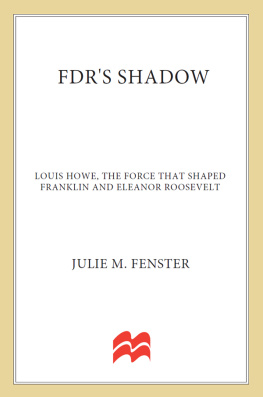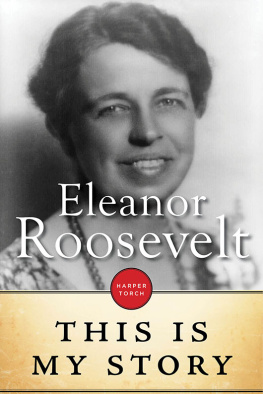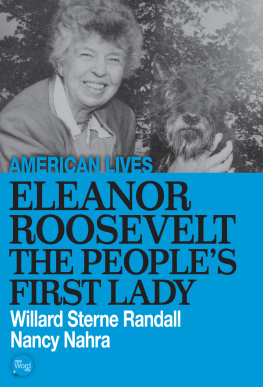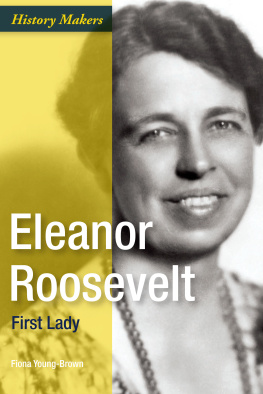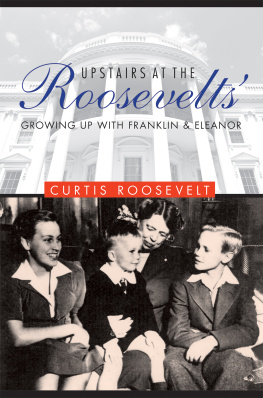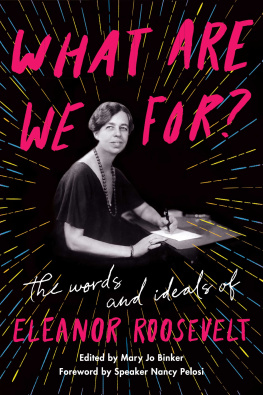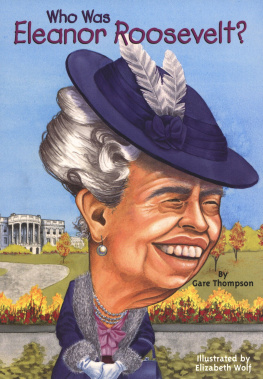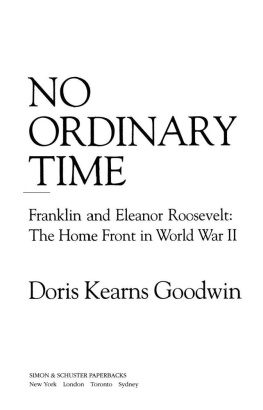FDR'S SHADOW
ALSO BY JULIE M. FENSTER
The Case of Abraham Lincoln
FDR'S SHADOW
LOUIS HOWE,
THE FORCE THAT SHAPED
FRANKLIN and ELEANOR ROOSEVELT
Julie M. Fenster

The author and publisher have provided this e-book to you for your personal use only. You may not make this e-book publicly available in any way. Copyright infringement is against the law. If you believe the copy of this e-book you are reading infringes on the authors copyright, please notify the publisher at: us.macmillanusa.com/piracy.
FDR'S SHADOW
Copyright Julie M. Fenster, 2009.
All rights reserved.
For information, address St. Martins Press, 175 Fifth Avenue, New York, N.Y. 10010.
First published in 2009 by PALGRAVE MACMILLAN in the United Statesa division of St. Martin's Press LLC, 175 Fifth Avenue, New York, NY 10010.
ISBN: 978-0-230-60910-5
Our eBooks may be purchased in bulk for promotional, educational, or business use. Please contact the Macmillan Corporate and Premium Sales Department at 1-800-221-7945, ext. 5442, or by e-mail at .
Library of Congress Cataloging-in-Publication Data is available from the Library of Congress.
A catalogue record of the book is available from the British Library.
Design by Letra Libre, Inc.
First edition: October, 2009.
10 9 8 7 6 5 4 3 2 1
Printed in the United States of America.
Louis Howe was probably the greatest influence in both my father and my mother's lives.
Elliott Roosevelt
June 20, 1979
Franklin D. Roosevelt Library,
Hyde Park, New York
PROLOGUE
April 18, 1936, didn't start out as a bad day at all to be the president of the United States, or to be Franklin D. Roosevelt. The news was mild, aside from unrest in Ethiopia. Congress was quiet and criticism of the president, while shrill, had yet to puncture the idolatry that made overconfidence the only real thing for Roosevelt to fear as he approached the end of his first term in office.
In the afternoon of that Saturday in April, Roosevelt made a surprise visit to the Corcoran Gallery of Art three blocks from the White House to see his own antiques on display: 192 naval prints and a dozen ship models on loan from his personal collection.
While Roosevelt was out that afternoon, he traveled to the Bethesda Naval Hospital, seven miles away, to spend time with Louis Howe, a longtime patient there.
April 18 was not a bad day to be the First Lady, either. That morning, Eleanor Roosevelt met a dozen girls from New York's elite Todhunter Schoolwhere she had once taughtand took them sightseeing in Washington. More than anything else, they wanted to go to the Federal Bureau of Investigation. Escorted past hundreds of other tourists, Mrs. Roosevelt and her party were taken on a tour by the director himself, J. Edgar Hoover.
In the evening, President Roosevelt dressed in white tie and tails to attend the semiannual Gridiron Dinner. He and a couple of hundred other guests were regaled with songs and skits presented by members of the Washington press corps. One ditty spoofed the Civilian Conservation Corps.
We joined the New Deal
to see the world
but what did we seethe C.C.C.
Eleanor Roosevelt was also out for the evening, with somewhat less laughter, attending a conference of the Washington Committee on Housing, of which she was a member. She delivered a speech on living conditions among the city's African American population and then left for home at about nine o'clock. The Gridiron Dinner lasted longer and was still noisy as the hour of eleven came and went, crowded by jokes poking fun at the Roosevelt administration.
The government of checks and balances has become one of all checksand no balances.
Even if it was the stuff of college humor, the audience found the show side-splitting.old enemiesby joining the ranks of the Republicans and Roosevelthaters. Alfreda, having just used her own pin money to get home from a date, whined:
I'm never going riding again with that Franklin Roosevelt.
No one laughed harder than Roosevelt. After the stage show was finished, those in the room raised their glasses in a formal toast to the president and then called on him for a speech. According to the rules of the Gridiron Club, his remarks were not to be reported by anyone who was present. But he was expected to be amusing and, no doubt, he was.
At the White House, a call came from the Naval Hospital at about 11:30 that night. By the time the president returned home, just before midnight, Eleanor was waiting for him with Stephen T. Early, the White House press secretary. Louis Howe had died at 11:10 PM.
The news was not a surprise to the Roosevelts, not on the face of it. Howe had lived with them for almost fifteen years. He had never been entirely well during that time, suffering most noticeably from asthma. During his final eight months, when he was staying at the hospital, he was still under their mantle. I go to see Louis every day that he will see me, Eleanor wrote in January.
As midnight approached that night, Eleanor attended to her obligation to telephone Howe's wife, Grace, who lived by herself in Fall River, Massachusetts. Steve Early left to prepare a news bulletin, which was released to the press at 12:10 AM. As to Franklin Roosevelt, he was in some sense on his own for the first time in twenty-five years.
Roosevelt may well have been uncertain about just where he was without Howe, but Time magazine wasn't. Admirers he had by the millions, the magazine would say of Roosevelt, Acquaintances by the thousands, advisers by the hundreds, friends by the score, but of intimates such as Louis Howe he had only one. The following morning, Roosevelt personally ordered that the White House flag fly at half-staff. Later in the day, he canceled all of his appointments and activities for at least two days, Monday and Tuesday. He remained in seclusion the rest of Sunday.
Eleanor wrote in her syndicated newspaper column that day, We can, of course, think of little else today but the loss of our old and dear friend, Colonel Howe. (The military title was honorary; Howe had been named a Kentucky Colonel in 1932.) A paragraph of tribute followed, referring to his pity, warmth, and sincerity, and ending with a line that would normally be quite unremarkable, practically constituting boilerplate in any other eulogy: His courage and loyalty and devotion to his family and friends will be an inspiration to them as long as they live. One of the mysteries lingering after Louis Howe, though, was just which were the family and which the friends.
Howe's wife, Grace, and their two adult children arrived in Washington on Sunday evening. After consulting with them, Franklin Roosevelt chose to hold the services at the White House, marking only the fifth time since 1920 that the White House was to be used for a funeral. The ceremony was scheduled for Tuesday, with calling hours beforehand. She then described herself as a grateful recipient of that criticism, without recalling for the reporters that she had also once inspired Howe's sympathy.
Franklin Roosevelt was not seen at all on Monday, nor on most of Tuesday. While Howe was best-known as the man who put Franklin D. Roosevelt in the White House, There were also those who thought the famed friendship was so one-sided that it barely fit the definition of the word, consisting in harsh terms of an indulgent boss who couldn't resist the adulation of his most ardent disciple. Roosevelt, for his part, made no effort publicly to cast light on his relationship with Louis Howe. On the eve of the funeral, he declined to see the press, as Eleanor had done. He didn't release a statement. He didn't volunteer to make any remarks at the funeral services, which would have been an appropriate tribute and one that might even have been expected of so effective an orator.

